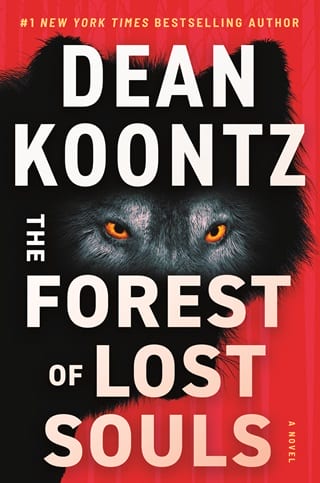69 COME NIGHTFALL
69
COME NIGHTFALL
Shortly before dusk fades to starlight, when the drones retreat and quiet settles across the mountains, Vida and Sam make camp on a gentle slope in open woods where spectral moonlight spares them from a blinding dark to which their eyes could never have adapted. They provide food and water for the dogs, and then sit with their backs to trees, eating PowerBars.
With the descent of darkness, the night insects remain silent. The great horned owls do not call to one another to establish their exclusive territories for the hunt ahead. The eerie, ululant cries of coyotes are not to be heard. If raccoons and opossums are foraging, they make less sound than mimes.
Vida knows—and surely Sam knows as well—that a mere human presence doesn't inspire such a profound hush as this among the creatures of the wilderness. It's as though the departure of the drones was followed by the arrival of some stalking ground-bound technology, robotic but stealthy, so alien that wild animals, though grown tolerant of humans, are reduced to alert stillness by this new and menacing intruder.
Strangely—or perhaps not—Vida and Sam are drawn to the same subject. Without suggesting the wisdom of whispering, they conduct their short and weary conversation sotto voce .
She says, "Do you sometimes wonder if our time is running out? Not just yours and mine. Everyone's."
"At some point," Sam says, "the machines won't need us, want us, or tolerate us."
"There is a poem about AI, by Richard Brautigan—"
"I know it. ‘All Watched Over by Machines of Loving Grace.'"
She's surprised and pleased that he's familiar with the poem, but more important is what he thinks of it.
"The premise is bad science fiction," he says. "Machines might be graceful if by ‘grace' we mean elegance and beauty in manner or motion. But they can never be loving."
Although she agrees, Vida says, "Some believe they can be."
"Even an ultimate artificial general intelligence, possessing all the knowledge of humanity, won't have a conscience or a soul. A person without a conscience is a sociopath. Sociopaths are incapable of love."
"A cure for cancer, solutions to intractable problems—an AGI might solve them all."
"Maybe. But sociopaths incapable of love are quite capable of extreme cruelty. In fact, they seem compelled to commit it."
After a silence, Vida says, "Maybe Boschvark's project here is a small threat in the scheme of things."
"Did your José think it was a small thing?"
"No. He said that many of our current crop of self-styled elites think they're gods. He said we've got to prove to them they aren't gods whenever we can."
"So let's finish the job he started." Sam's voice trails away, and he slurs the last word, and his head sags forward in sleep.
The dogs lie in a pile for comfort and a sense of security. Exhausted, they should be fast asleep, but they repeatedly lift their heads to survey the woods, as if some quality of the night reminds them that Death is in the world.
Later, when Vida wakes with her back still against a tree, the three dogs have succumbed; they're softly snoring. The great horned owls have found their voices, and insects sing. Also present are the wolves, sleeping in harmony with the Alsatians. Lupo raises his head to stare at her, his eyes full of the moon. Trusting the instinct of Nature's own, she allows sleep to take her once more.
 Fullepub
Fullepub 



